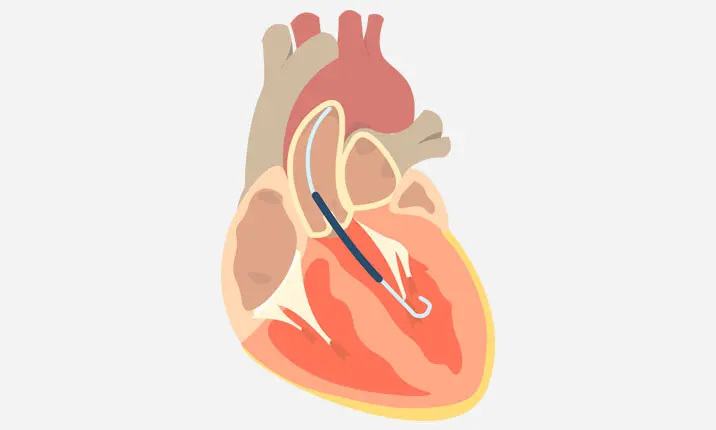Heart disease is an increasingly common health condition in Singapore – specifically, coronary artery disease (CAD), where the arteries in one’s heart get narrowed by the build-up of cholesterol deposits and calcified plaque. This results in a patient getting a limited supply of oxygen-rich blood to the heart, which over time can lead to heart failure or heart attack.
Fortunately, in most cases, CAD can be treated with percutaneous coronary intervention (PCI), also known as angioplasty – a minimally invasive procedure used to open blocked coronary arteries through the use of balloons or stents.
While there are many advantages to this procedure, such as smaller incisions, less blood loss and scarring as well as a quicker recovery, PCI may not be suitable for a small group of patients – individuals with health conditions such as weak hearts. Dr Paul Ong, cardiologist at Mount Elizabeth Novena Hospital, shares that for such patients, even such minimally invasive procedures can be extremely risky, and with unpredictable outcomes.
But there’s a new device available at the Mount Elizabeth hospitals that can offer such patients a promising outlook for a safer surgery. Known as the Impella heart pump, it is a tiny pump that has been designed to support the heart and help maintain its ability to circulate blood through the body during the entire course of surgery.
What is an Impella heart pump?
Dr Ong explains that Impella is a tiny heart pump – one of the smallest in the world – that sustains blood pressure and protects the body’s vital organs during heart procedures. It is a solution that can help make high-risk heart procedures safer by offering a ‘backup heart’. It supports the circulation of blood around the body and allows doctors to carry out interventions such as an Impella-assisted percutaneous coronary intervention or angioplasty safely.
“Impella is usually a device we use for patients with very weak heart functions – for example, they have multiple diseased blood vessels that need to be sorted out at the same time,” adds Dr Ong.
The treatment is also suitable for patients with kidney failure and those on dialysis, as their arteries are extremely calcified, and require significant work to have the arteries unblocked.
How Impella works: A backup for the heart
With Impella, as Dr Ong explains, the heart “gets a backup”. This means that when the procedure is going through a critical phase the heart can become stunted and unable to tolerate the ‘stress’ on it, the Impella heart pump will support the heart, so that the patient’s well-being is protected.
Using a simple analogy, Dr Ong compares the pump’s function to “acrobats doing somersaults in mid-air”. With Impella, we now have that safety net during surgery.
It means that the device serves as a backup in case the heart ‘malfunctions’ during a procedure such as a PCI. Such malfunctions include instances where the heart does not beat strongly enough, or if arteries are completely blocked. In the worst-case scenario, the heart may even stop for a few seconds.
Describing how it works in detail, Dr Ong says that the tiny, soft and flexible Impella pump is partially inserted inside the heart, specifically in the left ventricle through a very small puncture in the groin. Once in place, the Impella pump will monitor the heart’s ability to pump blood through the body. At any point during the procedure where the heart is not pumping well, a rotary motor in the pump will begin working to push the blood out to the aorta, and send it along to the rest of the body.
This ‘intervention’ is critical for a weak heart that may not be able to supply enough blood to sustain the patient’s cardiac output during the procedure. With it, even if the heart doesn’t manage to push out enough blood, it will be ‘topped up’ by the pump to keep the patient safe.
Once the procedure is complete, the Impella heart pump is switched off and removed. Should it still be required to support the heart’s function post-procedure, it may be left in the heart’s left ventricle until the condition stabilises.
Keeping your heart healthy
While it’s comforting to know that such advances in medical technology can help save lives, surgery should always be explored as a last resort for treating a heart condition like coronary artery disease. Preventing heart disease from occurring in the first place should always be the priority. As they say, prevention is always better than cure.
To this end, here are some tips to keep your heart healthy.
1. Maintain a healthy weight
Weight always poses a ‘silent heart risk’ where excess body fat can contribute to the development of conditions such as high blood pressure or diabetes, the precursors of heart disease. So, do watch your weight. One common method of screening is the Body Mass Index, where a range of 27.5 and above generally points towards one being overweight.
2. Watch your diet
A healthy, balanced diet rich in vegetables and low in salt, sugars, unsaturated fat and processed foods, can help to lower your risk of heart disease. And if you already have heart disease, it can help keep your condition under control.
3. Get active
Regular exercise can strengthen the heart. Aim to get about 150 minutes of exercise per week, prioritising cardio activities of moderate intensity. However, do note that with different health profiles comes different needs and thresholds, so whenever in doubt, consult a medical professional or specialist about your exercise plan.
4. Screen regularly
Should you have conditions such as high blood pressure, it will pose a risk of heart disease. Do consider preventive heart screening to check for any hidden heart disease risks. As a guideline, the Health Promotion Board actually recommends a cardiovascular risk assessment every 5 years from the age of 18 onwards. Should your risk levels be higher than average, do consider going for regular heart screenings and working with your family doctor or cardiologist to stay healthy.
Learn more about heart procedures with improved safety
Thanks to advances in technology, patients who usually have access to safe and viable treatment options can now look forward to safer and more promising medical outcomes.
This Impella heart pump is one such example where patients with more specific needs and considerations now have options for a better quality of life.
To find out more about Impella-assisted heart treatments and other minimally invasive heart procedures, make an appointment to speak with a cardiologist today.















